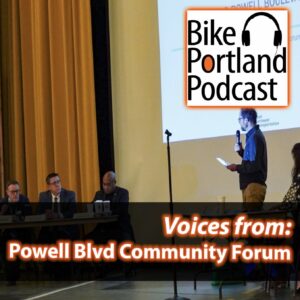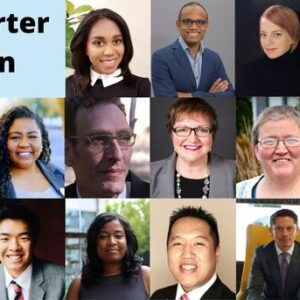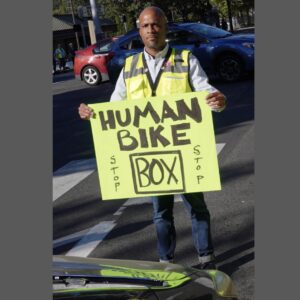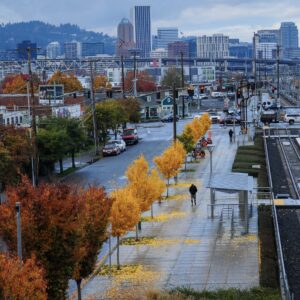On November 8th, Portland voters set into motion a massive shift in local politics when we voted overwhelmingly to support the charter reform measures. Simply put, our politics will never be the same. And that means the way we do advocacy won’t either.
If you want to be a changemaker in Portland, and be a part the exciting future many charter reform supporters think is now possible, it’s time to put on your thinking cap and learn how to operate in the new system. Because guess what? The powerful people and organizations that have a different version of the future are lining up to take advantage of the new playing field.
It was in this spirit that I called Matt Glazewski and Catie Gould and asked them to sit down for a chat in our new recording space in the BikePortland Shed (my new backyard office). I wanted to know how transportation advocacy might change once Portland has a new form of government.
“Portlanders need to start caring about who our new city manager and new city administrator is going to be, because that person is not elected. And that person potentially could be there for 10 years, and never actually have the will of the voter. So that’s exciting. But it’s also a little scary.”
– Matt Glazewski
“In 2018, city council authorized PBOT to make two new parking permit districts. Zero new parking districts have been created since. There’s been three different Pbot commissioners in that time and the institutional memory is just very short. Ideally, our city administrator is going to have a much longer memory and say, Hey, we’re supposed to do this.”
– Catie Gould
Matt used to work as a policy advisor for Portland City Commissioner Mingus Mapps and we had an interesting conversation in episode 18 of the podcast. As a former city staffer, I learned a lot by hearing his perspectives on what charter reform will mean to the day-to-day operations of City Hall. And as a former leader with BikeLoud PDX, member of the PBOT Bicycle Advisory Committee, and current researcher and writer for Sightline Institute, I knew Catie would also have some important insights to share.
Here are a few things we touched on:
- Why everyone needs to know City of Portland Chief Administrative Officer Michael Jordan, who is now in charge of the transition process and will be a key figure going forward.
- Why the new city manager position will be so important to the success (or failure) of this new form of government.
- Why depoliticization of city bureaus is such a huge deal and will have dramatic impacts on how transportation advocacy plays out.
- How will the role of bureau directors change and why does that matter?
- How will having 7 more city councilors impact Portland’s ability to influence policy of other agencies like TriMet, Metro, and so on?
As you’ll hear in this episode, we had a super informative conversation. I learned a lot and I think you will too. Thanks for listening. If you’d like a transcript, you can view a PDF here.
— Get all the links to subscribe and listen to this and past episodes at BikePortland.org/podcast.







Thanks for reading.
BikePortland has served this community with independent community journalism since 2005. We rely on subscriptions from readers like you to survive. Your financial support is vital in keeping this valuable resource alive and well.
Please subscribe today to strengthen and expand our work.
Great discussion! Thanks. Hope you have more podcasts like this.
7 more city commissions? Do you mean 7 more City Councilmembers? We just got rid of the commissioner form of government, so there will be no more commission and no more city commissioners. And thank goodness for that.
Yeah. An obvious mistake. Fixed it. Thanks.
Sorry for being nit-picky, just found it kind of confusing.
Thanks for the great podcast!
no problem Psmith. I appreciate you catching the mistake. That episode was hard for me because I’m not an expert in that stuff and it was a bit out of my comfort zone.
I feel the need to point out that Sightline is not-only funded by MAGA real-estate zillionaires* but also by tech-bro crypto zillionaires, including Sam Bankman-Fried:
https://www.openphilanthropy.org/grants/?q=&focus-area=land-use-reform
Open Philanthropy receives much of its funding from tech-bro crypto billionaires.
https://www.grid.news/story/economy/2022/11/15/sam-bankman-fried-gave-millions-to-effective-altruism-what-happens-now-that-the-money-is-gone/
With fiscal support like this it’s no surprise that Sightline has a laser-focus on deregulation of the rich while stabbing tenants in the back by supporting landlord-sponsored tenant law.
*”Up for Growth” is an org founded by Clyde Holland, an infamously evil MAGA zillionaire that sponsored Sightline-organized YIMBYtown and is a long-time direct donor to Sightline.
https://yimby.town/sponsors/
https://www.upforgrowth.org/person/clyde-holland
https://www.nwprogressive.org/weblog/2015/03/meet-tim-eymans-new-wealthy-benefactor-developer-clyde-holland-of-holland-partners.html
Just in case someone disputes the connection between the FTX Foundation and Open Philanthropy:
https://www.vox.com/future-perfect/2022/8/8/23150496/effective-altruism-sam-bankman-fried-dustin-moskovitz-billionaire-philanthropy-crytocurrency
Soren what does any of this have to do with any of the discussion on the podcast
Just to point out the obvious, but as long as there are public dollars to spend and it is done by bureaus or departments, there will be no “depolitization” ever in Portland or any other democracy, no matter what form of local government you have, or metropolitan, county, state, or national government for that matter. Like most Americans, I live in a city that has a city manager who manages the city staff, but even he is answerable to city council and our mayor, as are all his underlings, and all the senior staff continue to make decisions based on what they think elected officials want rather than the needs of the community.
… is an incredibly naive statement that is simply never the case in any other US city. JM, you really ought to know better. It’s going to be the same as it ever was.
The bureaus will no longer be able to be traded for political points. They won’t be specific to politicians in the same way they are now. Those are facts and I believe “depoliticization” is a fine way to describe that (and so did both my guests fwiw). Obviously things will still get political. That’s not what I’m saying.
It’s not going to be the same. Will the results be different? We’ll find out.